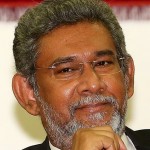Reconciliation, Identity & Security: Pact For Postwar Political Reconciliation
By Dayan Jayatilleka -June 1, 2014
 Like President JR Jayewardene before him, President Rajapaksa will win the (re) election and lose the crisis. In these days when ‘homespun’ is all the rage, one may well resort to the Sinhalese saying “do not fall in broad daylight, into the pit one plunged into at night”. The Rajapaksa regime is about to take a long jump in broad daylight into the same pit that his most illustrious predecessor President Jayewardene plunged into at night as it were, in the 1980s, culminating in the traumatic events of 1987.
Like President JR Jayewardene before him, President Rajapaksa will win the (re) election and lose the crisis. In these days when ‘homespun’ is all the rage, one may well resort to the Sinhalese saying “do not fall in broad daylight, into the pit one plunged into at night”. The Rajapaksa regime is about to take a long jump in broad daylight into the same pit that his most illustrious predecessor President Jayewardene plunged into at night as it were, in the 1980s, culminating in the traumatic events of 1987.
How does one define political reconciliation in Sri Lanka? I regard it as the problem of the reconciliation of collective political identities in a manner that permits a larger, shared political identity to be negotiated or evolve.
That definition was the easy part. The effort at political reconciliation must take place on the terrain of reality, not of abstract concepts or ideologies. How does one define reality? Reality in this case denotes the realities of power relations, which in turn derive from and reflect, in some considerable measure, external and domestic geopolitical realities. This must be the framework, parametric more than prescriptive, of the discussion.
The unreality and unreason of the Sri Lankan discourse, in both its (state/govt) policy and (civil society) critical commentary manifestations, never ceases to amaze me. Reading the opinions on political reconciliation and the obstacles to such, in the commentary on the fifth anniversary of the end of war, I am struck by the representatives or ideologues of the Sri Lankan state who take up postures which ignore that we are vulnerably located in a uni-polar South Asian region and on the doorstep of the pre-eminent (or hegemonic) regional power. I am similarly struck by the number of holders of postgraduate degrees as well as aspirants to them, who are able to pontificate confidently on what needs to be done in and by Sri Lanka, without mentioning, still less taking into very serious account, the factor of a 300,000 (Plus) strong battle-hardened military. These errors have tragic antecedents.

